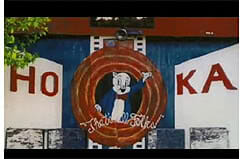Headlines
The Decline of Oxford Civilization
 A kid in a trench coat, a dummy in a bedspread, and a night at the Hoka.
A kid in a trench coat, a dummy in a bedspread, and a night at the Hoka.
Some kids go off the rails and get lost. Others merely get interested in expanding their cultural experience outside of what’s available on the shelf at the mall. The latter sometimes involves, well, stepping into areas where permission won’t take you.
I was in the eighth grade at what was Oxford Junior High School at the time. My friends and I hit a heavy metal phase, sporting denim jackets covered in heavy metal band buttons, spiked bracelets, and fake earrings from a women’s boutique in the mall and pinning Ozzy Osbourne and WASP posters on the walls. This was during the heyday of the PMRC, when a mere hint that your son was listening to Judas Priest was supposed to be a red flag he might smoke PCP and stab himself with a Rambo knife. By the second part of eighth grade, 1986, we’d moved onto punk rock. It had an edge, urgency, and slobber not present in, say, Whitney Houston’s hits of the day. We weren’t bad kids. We just wanted something different.
Somehow we’d become aware of The Decline of Western Civilization, a 1981 documentary film by Penelope Spheeris, which turned an eye of detail to the Los Angeles punk scene of the late ‘70s and turn of the ‘80s. Featured were bands such as Black Flag, the Germs, X, and Fear. We had no Netflix, no YouTube, and no Amazon. We had the Hoka, which we learned would be showing the film.
It was a weeknight. I don’t remember the date, but I think it was close to a holiday, because my grandmother was visiting from Picayune. I’d crunched options in my head enough to conclude that my parents would not grant me permission to go see this R-rated movie if I were to ask. So, I didn’t. I hatched a plan, one of many plans in my formative years that looked tight on paper but suffered from poor execution.
I planned to attend the movie with two friends, Tom Queyja and Tait Graves. Tait lived in my neighborhood, and Tom and his mom were to come pick us up in Mrs. Queyja’s car. She wasn’t aware I was not supposed to be going.
Back at home, I bid my parents “good night” and ostensibly retired to bed, pretty early. My grandmother was already snoozing in the guest room. It was about 8 p.m. Some years before, when I was a child and not a sophisticated junior high turd, I’d asked for and received from Santa a ventriloquist dummy. I’d actually requested either Charlie McCarthy or Lester, both featured in the Christmas catalog. What I got was some generic dummy. I played with it for approximately five minutes on Christmas day and lost interest. He lay dormant in storage for years; probably dreaming of the day I would call him into active service.
I found the nameless dummy and laid him under the covers of my bed as though he were I, augmenting his bedspread-covered form with a pair of sneakers to appear to be my feet. His molded plastic slick-backed hair was visible just a couple inches out of the covers on the pillow, which I predicted would pass for the top of my head in the dark.
I was wearing an old, black London Fog trench coat that had been my dad’s in the ‘60s. That and rolled-up jeans and Chuck Taylor high-tops were my uniform of the day. My folks were watching television in their bedroom. I tiptoed down the hall to the living room, where I could quietly ease out the sliding glass doors on the front of the house. I then crept back around to the carport to get my Raleigh BMX bike and haul my 70-pound ass to Tait’s house to catch my ride.
We arrived at the Hoka. Inside the theater, we met a few other friends and took seats among the various other people. I wanted to sit in the front row, so I did. Soon two college guys sat next to me, setting a cooler down. The one next to me, a very large, bushy-haired mug, offered me a beer, which I politely declined. We proceeded to enjoy the gritty reality on the screen, which involved a lot of great, raw live music footage, interviews, heroin addicts, and some ancillary, quite unstimulating junkie nudity. Today’s reality TV couldn’t hold a candle to it.
What I didn’t know was that not long after I’d made my cunning sneak-away from the house, my father had gone into my bedroom to close the window, as it was supposed to get chilly that night. He turned on the light in order to see to get around to that side of the bed. In the glaring light, the ventriloquist dummy failed to convince. At least he didn’t cave under questioning.
Didn’t matter, since it wasn’t hard for my folks to figure out where I was. They immediately figured Tait must be involved, so they called his parents, who told them I’d left with the Queyjas and Tait to go to the Hoka. Dad, a doctor, called a police officer who was a patient of his.
Midway through Decline, the decline of my scheme was in full swing. A friend in the row behind me tapped me on the shoulder to alert me that dad was on the set. I glanced to the back and saw my enraged dad storming down the aisle in his hunting boots and orange parka, arms board-straight at his sides, fists clenched, face full of barely contained rage. I slunked down into my seat and down into my trench coat in the darkness.
Dad clomped down to the front and looked around, but never saw me. He looked up at the screen, which, of course, was showing a scene of some strung-out punk chick with her boobs showing. He shook his head and prowled back up the aisle.
At the end of the film, Tom and Tait and I went back outside and piled into Mrs. Queyja’s waiting Nova. As we pulled away from the Hoka out into the street, we saw my dad’s bright red ’86 Nissan Z-Car and a police car, lights flashing, parked end-to-end in a V formation, blocking the road.
I got out of the Queyjas’ car, and the officer, on script, led me over to the squad car and put me in the back seat. Dad, also on script, walked over to the open door and acted like he was asking the officer if he could speak to me. “Well, do you want to go to jail or come home with me?” he said. I gave the obvious answer and went home to what turned out to be an approximately two-hour discussion in which my parents sought to find answers about how my young life had spiraled so far out of control that I would go watch a critically acclaimed movie. Mom asked what kind of movie it was, and I told her it was a documentary about music. I think the last time she’d been to the Hoka was in the ‘70s when she took me to see 101 Dalmatians there one sweltering afternoon.
“Ginger, it was a poooorno movie,” Dad interjected.
What’s my point? The moral of the story is to thank Ron Shapiro for the Hoka, and I thank my incredible parents for caring what the hell I was up to.
— Tad Wilkes, tad.wilkes@hottytoddy.com


















































